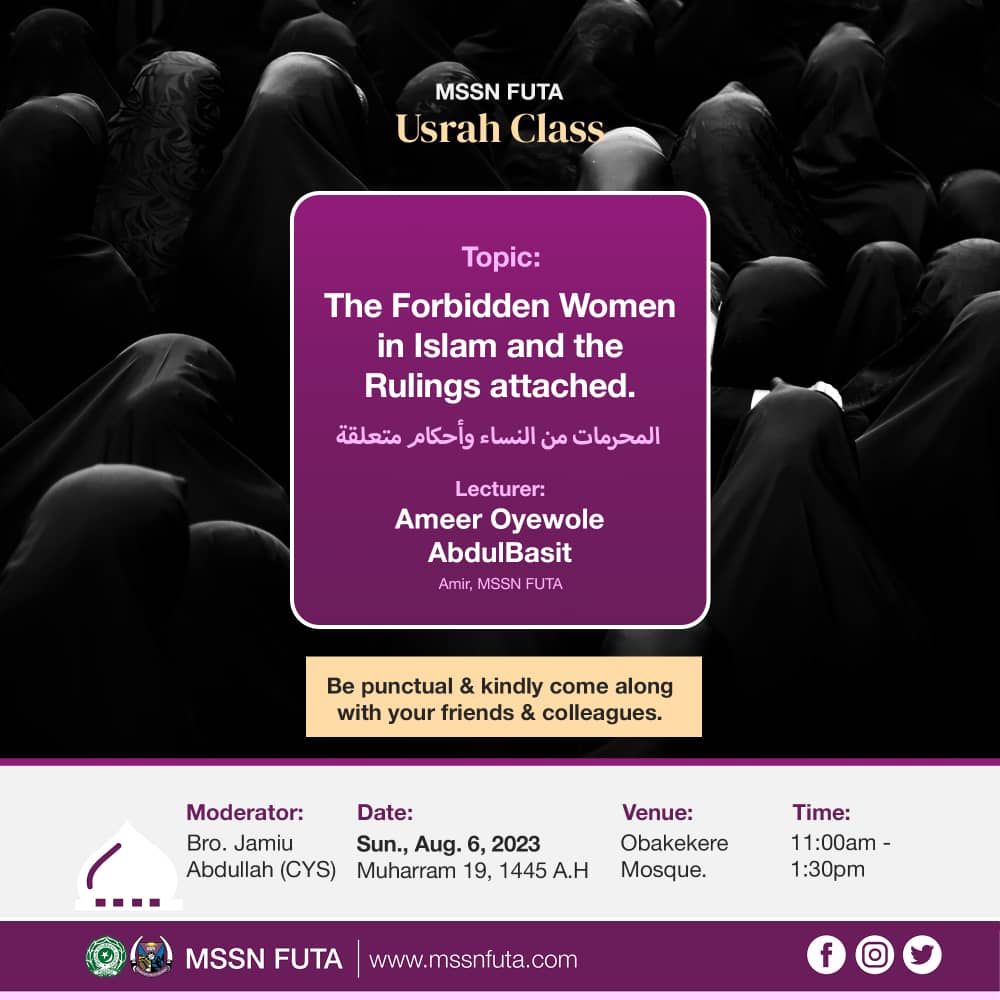[Episode 1]: The Forbidden Women in Islam and Rulings Attached

Introduction:
We praise Almighty Allāh, the Ever Compelling Creator, the Granter of health and wealth, the One and Absolute to Eternal Vitality who makes Existence exist, the creator of the entire Universe. May the peace and benediction of Allāh be upon the Noble Prophet Muhammed (SAW),his household, his companions and to the generality of the Muslim Ummah.
Allooh (SWT) has ordained on us all, dealings; and has separated for us as humans what is good and what is bad, right?
Of course!
We (Humans) derive enjoyment from three basic things:
1. Satisfying our stomach
2. Satisfying our urge
3. Satisfying our reputation
We share similarities with animals regarding the first two. That, however, does not mean we should act like animals in dealing with them. The third can barely be sensed among animals and that is a testament to the fact that Allah has blessed us with knowledge greater than theirs.
What does this mean?!!
It means the third item has to be satisfied and protected.
Now, tighten those seat belts. You’re going to enjoy this ride as we learn about the topic: THE FORBIDDEN WOMEN IN ISLAAM with these exciting Q&A.
Q1: Who are forbidden women ?
A1: In Islaam, they are the women whom Allooh (our Lord) and His messenger have declared unlawful for men to have legal or illegal union with, regarding satisfying their sexual urge through them.
Q2: But why has Allah forbidden their (men) union with them (women)?
A2: It is due to the relationship between them. That can be in 3 forms:
(1) Family relationship
(2) In-law relationship
(3) Breastfeeding relationship.
Q3: Oohh! Does that mean any woman who has this relationship with a man is forbidden from marrying such man?
A3: Good question! But first, we need to understand that the basic ideology of our religion is that a man is entitled to marry any woman of his choice unless it is explicitly mentioned in the Quran or the Sunnah that such woman is forbidden.
Q4: Okay, I get that. But are those women forbidden forever (permanently) or just for a while (temporarily)?
A4: Yes, most of them are permanently forbidden and that is the basic, as there must be an obvious proof and insight that it is temporary.
Q5: Na’am. Hmmmm, so who are the permanently forbidden women?
A5: They are mentioned in the Quraan and the Sunnah of Our Prophet (may peace and blessings be upon him). Collectively, they are:
FROM FAMILY RELATIONS:
1. One’s mothers, they include one’s immediate mother, grandmother, great grandmother, and so on, paternal (from the father’s side) or maternal (from the mother’s side)
2. One’s daughters, they include one’s immediate daughters and their daughters, down the lane.
3. One’s blood sisters, they include, paternal sisters, maternal sisters and full sisters.
4. The sisters of one’s fathers, whether they are paternal or maternal or full.
5. The sisters of one’s mothers, same as above.
6. The daughters of one’s blood brother or sister.
FROM IN-LAWS
1. The mother of one’s current wife or past wife.
2. The wife of one’s sons (i.e. immediate sons and their sons).
3. A woman who was once married or currently married by one’s father.
4. The daughters of one’s wives from another man/men if he (the man) already had intercourse with them (the wives).
FROM BREASTFEEDING:
1. One’s breastfeeding mother other than his birth mother.
2. One’s sister(s) from breastfeeding other than from birth (i.e. breastfed by the same woman).
And in fact, the same category of women forbidden with family relations are also forbidden with breastfeeding. This means the daughters of one’s sister from breastfeeding are also forbidden just as the daughters of one’s blood sister are forbidden for one to marry.
All the afore-mentioned category are permanently forbidden.
TO BE CONTINUED...
Did you like it?…
This is just a drop in the bucket.
Follow me as I take you to the second episode
A human may have to sacrifice the first two just to satisfy his reputation but animals never would.
Therefore, we are higher than them, we are superior to them. Why would the superior stoop low to the status of the inferior It should never be



0 Comments